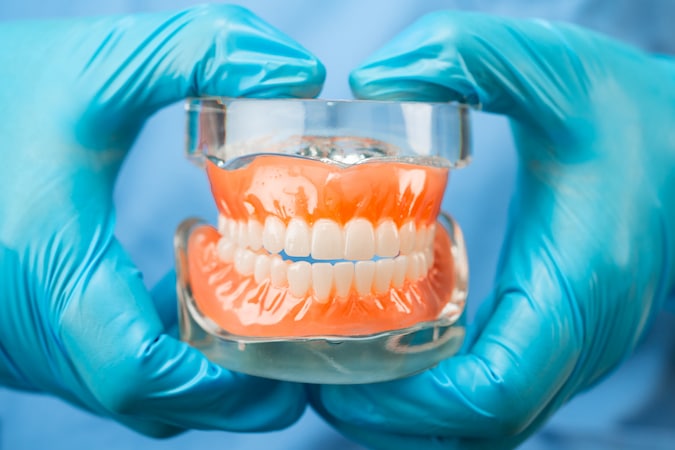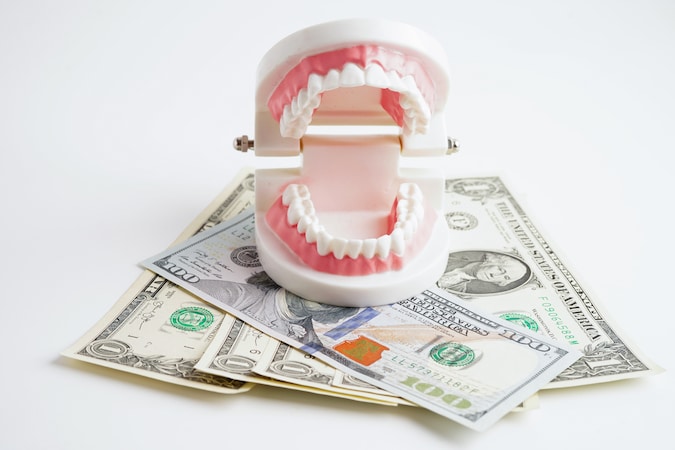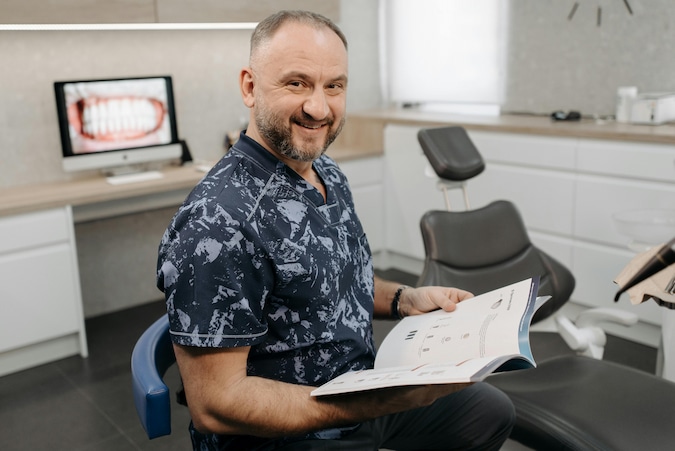
Dentures Guide: Types, Costs, and Essential Care

If you’re considering dentures, understanding the options, costs, and care involved can help you make an informed decision. This guide covers everything you need to know to choose the right denture type, maintain them, and find affordable solutions.
Dentures restore function and aesthetics for those with missing teeth. From full and partial to implant-supported, each denture type is tailored to meet individual needs. This article provides insights on types, costs, and maintenance to help you select a denture that fits your lifestyle and budget. For those exploringdental insuranceoptions to assist with costs, SelfGood offers coverage solutions that can make restorative treatments more affordable.
Key Takeaways:
- Different types of dentures (full, partial, implant-supported) suit various needs.
- Costs depend on materials, type, and geographic location, with payment options available.
- Proper cleaning, storage, and regular adjustments help dentures last longer.
Understanding Dentures: Purpose and Who Needs Them

Dentures are custom-made dental appliances that replace missing teeth and restore the structure, appearance, and function of the mouth. They are especially beneficial for the elderly, individuals who have suffered injuries, or those experiencing severe oral health issues.
Having well-fitted dentures is essential for comfort, allowing users to chew, speak, and smile confidently. With advancements in materials and design, modern dentures offer a more natural appearance and a secure fit than ever before.
Types of Dentures Explained
Choosing the right denture type involves understanding the benefits and limitations of each option. Here’s an overview of the main types of dentures available.
Complete Dentures
Complete dentures are ideal for individuals who have lost all their upper or lower teeth. These dentures rest on the gums and are typically made of acrylic, giving a natural appearance.
- Benefits: Full dentures restore the appearance and function of a complete set of teeth, enabling better chewing and speaking.
- Limitations: They may feel less stable than other types, especially without adhesives or implants, and can require adjustments as the jaw structure changes over time.
Partial Dentures
Partial dentures are designed for people who have lost some teeth but still retain healthy natural teeth. They are attached to the remaining teeth with metal clasps or precision attachments, providing a secure fit.
- Advantages: They help maintain alignment by preventing remaining teeth from shifting, and they are a more affordable option than full dentures.
- Ideal Candidates: People with several missing teeth who seek a reliable, non-invasive replacement option.
Immediate Dentures
Immediate dentures are temporary appliances inserted on the same day as tooth extractions, allowing patients to leave the dental office with a complete smile.
- Pros: Immediate dentures help bridge the gap until permanent dentures are ready, offering immediate function and aesthetics.
- Cons: They often require frequent adjustments as the gums heal and shrink, and may not fit as precisely as custom dentures created after healing.
Implant-Supported Dentures
Implant-supported dentures are anchored to dental implants instead of resting solely on the gums. These are best suited for individuals with sufficient bone density to support implants.
- Benefits: They offer increased stability, comfort, and are less prone to shifting than traditional dentures.
- Ideal Candidates: Individuals seeking a long-term solution with strong jawbone support.
Overdentures
Overdentures are similar to traditional dentures but are supported by remaining natural tooth roots or implants, providing enhanced stability and reducing pressure on the gums.
- Benefits: Overdentures help preserve the jawbone, making them a good choice for those concerned about bone loss and seeking a more stable option.
Choosing the Right Denture Type
Selecting the best denture type depends on various factors, including oral health, lifestyle, and budget.
- Factors to Consider: Each denture type requires different levels of care. For example, implant-supported dentures may require a higher initial investment but offer greater long-term comfort and stability.
- Consulting with a Dentist: Professional guidance is crucial in choosing a denture type that fits your lifestyle, comfort needs, and financial considerations.
- Quick Comparison: A side-by-side comparison of each type’s pros and cons can aid in making a well-informed choice.
Denture Costs and Payment Options

The cost of dentures varies based on type, materials, and geographical location. Here’s what to expect.
Factors Influencing Cost
- Materials Used: Porcelain and acrylic are popular materials, with porcelain often being more expensive due to its durability.
- Procedure Complexity: The degree of customization and any necessary extractions or implants will impact the price.
- Location: Costs can differ by location, with urban centers generally having higher fees.
Average Costs for Different Dentures
- Complete Dentures: Prices typically range from $1,500 to $3,000 per arch.
- Partial Dentures: These range from $700 to $1,800, depending on customization.
- Implant-Supported Dentures: More expensive, usually $15,000 or more for a full set, due to the implant procedure.
Insurance and Payment Options
- Insurance Coverage: Many dental insurance plans partially cover denture costs, though the amount varies by plan.
- Financing Options: Many dental offices offer financing plans or third-party services to make dentures more affordable with monthly payments.
Denture Care and Maintenance
Proper maintenance extends the lifespan of dentures, keeping them comfortable and functional.
Daily Cleaning Routine
- Brush dentures daily with a soft-bristle brush and non-abrasive cleaner.
- Rinse dentures after meals to remove food particles and prevent staining.
Denture Storage and Maintenance
- Store dentures in a denture solution when not in use to prevent warping and maintain moisture.
- Avoid hot water, which can distort their shape.
When to Seek Adjustments or Replacements
Regular dental check-ups are crucial for ensuring a good fit. If you experience discomfort, pain, or difficulty chewing, it’s time to visit your dentist for adjustments or replacements.
Final Thoughts
Dentures are a valuable solution for restoring functionality, aesthetics, and confidence for individuals with missing teeth. From traditional full dentures to advanced implant-supported options, choosing the right denture depends on your personal needs, lifestyle, and budget. With proper care and regular maintenance, dentures can provide years of reliable use, improving both oral health and quality of life.
Frequently Asked Questions
How Long Do Dentures Last?
Most dentures last between 5 to 10 years, depending on the material and how well they’re maintained. Regular care and adjustments help extend their lifespan.
Can You Sleep with Dentures In?
While you can sleep with dentures in, it’s generally recommended to remove them at night to allow your gums to rest and to reduce the risk of infection.
What Foods Should You Avoid with Dentures?
Sticky and hard foods, like caramel, popcorn, and tough meats, can damage dentures or cause discomfort. Soft, easy-to-chew foods are typically recommended for denture wearers.
Sources:
- American Dental Association. (n.d.). Denture care and maintenance. ADA guidelines on denture care .
- Centers for Medicare & Medicaid Services. (2023). Medicare & dental coverage. Medicare options for denture coverage .
- National Institute on Aging. (2022). Oral health and aging. Oral health tips for aging adults .




